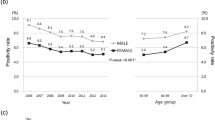Abstract
Background
Guaiac tests are the most widely used tests to detect colorectal cancer (CRC). However, their sensitivity is relatively low and results may be affected by various factors. Immunofecal occult blood test (IFOBT) is specific for human hemoglobin and does not require dietary restrictions.
Aims
The aim of this study was to evaluate the effectiveness of IFOBT for the screening of precancerous lesions and CRC.
Methods
From July 2006 to June 2007, IFOBT was performed on 5,919 adults who received periodic health examinations in our hospital. The positive cases were examined by colonoscopy and a double-contrast barium enema. Diagnosis was confirmed by histopathological analysis.
Results
Positive IFOBT was detected in 314 of 5,919 cases (5.30%). Further examinations were made in 264 IFOBT-positive cases. Of these, 116 cases with colorectal cancer (16 cases) or precancerous lesions (94 cases with colorectal adenomatous polyps and 6 cases with active ulcerative colitis) were detected. The total detection rate of CRC and precancerous lesions was 43.94% (116/264). TNM classification of 16 CRC cases was as follows: TNM I in eight cases (50.00%), TNM II in seven cases (43.75%) and TNM III in one case (6.25%), indicating IFOBT can detect CRC in the early stages.
Conclusion
Regular IFOBT can detect precancerous lesions and CRC in early stages and can thus reduce mortality from CRC.

Similar content being viewed by others
References
Daniel L, Joseph J, Robert H, et al. Noninvasive testing for colorectal cancer: a review. Am J Gastroenterol. 2005;100:1393–1403.
Autier P. Should organised faecal occult blood test screening be established? Ann Oncol. 2002;13(1):57–60.
Strul H, Arber N. Fecal occult blood test for colorectal cancer screening. Ann Oncol. 2002;13(1):51–56.
Bleiberg H. Hemoccult should no longer be used for the screening of colorectal cancer. Ann Oncol. 2002;13(1):44–46.
Levi Z, Hazazi R, Rozen P, et al. A quantitative immunochemical faecal occult blood test is more efficient for detecting significant colorectal neoplasia than a sensitive guaiac test. Aliment Pharmacol Ther. 2006;23(9):1359–1364.
Nakama H, Kamijo N. Accuracy of immunological fecal occult blood testing for colorectal cancer screening. Prev Med. 1994;23(3):309–313.
Rozen P. Cancer of the gastrointestinal tract: early detection or early prevention? Eur J Cancer Prev. 2004;13(1):71–75.
Levin B, Brooks D, Smith RA, et al. Emerging technologies in screening for colorectal cancer: CT colonography, immunochemical fecal occult blood tests, and stool screening using molecular markers. CA Cancer J Clin. 2003;53(1):44–55.
Labianca R, Beretta GD, Mosconi S, et al. Colorectal cancer: screening. Ann Oncol. 2005;16(Suppl 2: ii):127–132.
Atkin WS, Northover JM. Protagonist: population based endoscopic screening for colorectal cancer. Gut. 2003;52(3):323–326.
Brenner DE, Rennert G. Fecal DNA biomarkers for the detection of colorectal neoplasia: attractive, but is it feasible? J Natl Cancer Inst. 2005;97(15):1107–1109.
Mandel JS, Bond JH, Church TR. Reducing mortality from colorectal cancer by screening for faecal occult blood. Minnesota colon cancer control study. N Eng J Med. 1993;328:1365–1371.
Hardcastle JD, Chamberlain JO, Robinson MH, et al. Randomised controlled trial of faecal—occult-blood screening for colorectal cancer. Lancet. 1996;348:1472–1477.
Kronborg O, Fenger C, Olsen J, et al. Randomised study of screening for colon cancer with faecal-occult-blood test. Lancet. 1996;348:1467–1471.
La Vecchia C. Fecal occult blood screening for colorectal cancer: open issues. Ann Oncol. 2002;13(1):31–34.
Yan HY, Ge ZZ. Research status of fecal occult blood test in the early diagnosis of colorectal cancer. Chin J Gastroenterol. 2006;11(6):376–378.
Anderson WF, Guyton KZ, Hiatt RA, et al. Colorectal cancer screening for persons at average risk. J Natl Cancer Inst. 2002;94(15):1126–1133.
Vernon SW. Participation in colorectal cancer screening: a review. J Natl Cancer Inst. 1997;89(19):1406–1422.
Yeazel MW, Church TR, Jones RM, et al. Colorectal cancer screening adherence in a general population. Cancer Epidemiol Biomarkers Prev. 2004;13(4):654–657. (Erratum in: Cancer Epidemiol Biomarkers Prev. 2004;13(9):1550).
Scales CD Jr, Fein S, Muir AJ, et al. Clinical utilization of digital rectal examination and fecal occult blood testing upon hospital admission. J Clin Gastroenterol. 2006;40(10):913–918.
Atkin WS, Morson BC, Cuzick J. Long-term risk of colorectal cancer after excision of rectosigmoid adenomas. N Engl J Med. 1992;326:658–662.
Rex DK, Overhiser AJ, Chen SC. Estimation of impact of American college of radiology recommendations on CT clonograph reporting for resection of high-risk adenoma findings. Am J Gastroenterol. 2009;104:149–153.
Crespi M, Lisi D. Is colorectal cancer screening by fecal occult blood feasible? Ann Oncol. 2002;13(1):47–50.
Mizutani S, Fumitani M, Kaneshiro E, et al. Fundamental evaluation of fully automated fecal occult blood analyzer “OC-SENSORμ”. J Med Pharm Sci. 2002;47(5):769–773.
Noboru G, Michiko F, Keiko I, et al. Basic study of OC-SENSOR μ, a compact fully automated immunochemistry analyzer for fecal occult blood tests. J Clin Lab Inst Reag. 2002;25(1):57–62.
Vilkin A, Rozen P, Levi Z, et al. Performance characteristics and evaluation of an automated-developed and quantitative, immunochemical, fecal occult blood-screening test. Am J Gastroenterol. 2005;100(11):2519–2525.
Castiglione G, Grazzini G, Miccinesi G, et al. Basic variables at different positivity thresholds of a quantitative immunochemical test for faecal occult blood. J Med Screen. 2002;9(3):99–103.
Robert A, Vilma C, Harmon J. American cancer society guidelines for the early detection of cancer. CA Cancer J Clin. 2006;56:11–25.
Smith RA, Cokkinides V, Eyre HJ. American cancer society guidelines for the early detection of cancer, 2006. CA Cancer J Clin. 2006;56(1):11–25 (quiz 49–50).
U.S. Preventive Services Task Force. Screening for colorectal cancer: recommendation and rationale. Am Fam Physician. 2002;66(12):2287–2290.
Financial support
Supported by a grant from the Shanghai Leading Academic Discipline Project (No. Y0205 to Zhi-Zheng Ge).
Competing interests
The authors declare that they have no competing interests.
Author information
Authors and Affiliations
Corresponding author
Additional information
Dr. Zhi-Zheng Ge is accepting full responsibility for the conduct of the study.
Rights and permissions
About this article
Cite this article
Yang, H., Ge, Z., Dai, J. et al. Effectiveness of the Immunofecal Occult Blood Test for Colorectal Cancer Screening in a Large Population. Dig Dis Sci 56, 203–207 (2011). https://doi.org/10.1007/s10620-010-1264-8
Received:
Accepted:
Published:
Issue Date:
DOI: https://doi.org/10.1007/s10620-010-1264-8




